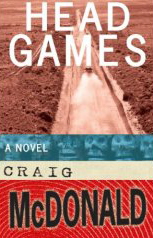 BUY IT FROM AMAZON: CLICK HERE!
BUY IT FROM AMAZON: CLICK HERE!
MSRP: 14.95
AUTHOR: Craig McDonald
PUBLISHER: Bleak House Books
PAGES: 300
Author website
You’ve never heard of Hector Lassiter? Pulp novelist. Screenwriter. The man who lied about his age to ride in the Pershing Expedition? Who went overseas to fight in Europe? Notorious womanizer. He had that famous falling out with Hemingway and had a hand in making Orson Welles’ Touch of Evil? It’s rumored he had a hand in the brutalization of a book critic who, in a scathing review of one of his books, dared to say bad things about his daughter who died at the age of four because of a weak heart due to her mother’s heroin addiction.
And that’s the beauty of Craig McDonald’s debut novel Head Games. It’s a delirious blur of fact and fiction, of lies and truth. It’s the kind of story you over-hear in a bar told by the drunk that wants to impress his friends. It’s an epic ball-buster of a novel and I loved it.
McDonald’s career as a journalist and famed interview of authors helps him here, and the influence of greats can be seen, from Hemingway(though, obviously, McDonald never interviewed the great man) to Elmore Leonard and James Crumley, but McDonald has his own voice, it’s just easy to see the kind of writers he loves in his words.
Hector Lassiter, fifty-seven years old, is meeting up with a friend in a Mexican dive bar with poet and journalist Bud Fiske, sent by True Magazine to profile him, in tow. In a fast turn of events, Hector’s friend is dead, Bud and Fiske are under attack by Federales and they’re on the road with Pancho Villa’s head in the trunk on their way to deliver it to Prescott Bush so the notorious Skull and Bones society can add it to their trophy case.
Remarkably, a novel with a similar plot came out just a few months ago. Warren Ellis’s Crooked Little Vein, like McDonald’s Head Games, is a road trip novel through America, exposing the dark heart of the people that populate it while on a mission for the government. But while Ellis’s debut was a limp and flaccid effort filled with fake and often obnoxious characters and a bizarre and clichéd view of America(In Ellis’s book, Texas is characterized by a macho steak house), McDonald blends the real and the fake, painting a vivid picture of America’s darker aspects during and before 1950’s America without ever losing sight of writing rich characters with depth. Taking place primarily in the West, it works as a hallucogenic gonzo western, with Mexican assassins that should have been dead ages ago and deadly legendary bandits, as well as a road trip novel.
You know you’re in for a ride when your characters rob graves to steal heads to fake out the many Yale frats after them for Villa’s head.
Normally, I detest when a writer has his protagonist interact with real people, like in Max Allan Collins’ awful Nate Heller novels, but when you’re digging through America’s history and creating a legend, how can you respect or buy into it when the story is filled with people that never existed? Remember, this is the type of story you hear in a bar, it needs to be big and epic, so when Hector visits the set of Touch of Evil, it makes perfect sense. If you have any familiarity at all with the history of many of the pulp writers of that era, you know that their lives were just as weird. It does get a little too cute at times, and the story is often slowed as McDonald has his characters tell stories of their lives and events in history, but it mostly works, and with such a great protagonist as Hector, wry and full of life and funny as hell, yet with a dark heart beating inside him, it’s easy to forgive McDonald’s stumbles in pacing.
It’s a legend and memoir, remember, these things tend to get what’s real and what’s fake blurred until it is straddling the line of myth and reality.
Yet…
Instead of ending Hector’s journey at the logical place, with the promise of a sequel evident in its final words, McDonald goes on for another forty pages from the point of view of Hector’s friend and biographer, half-ruined but given new life by Hector’s influence, Fiske. It’s a revenge tale, and it would have made a great novel on its own, but at forty or so pages, it’s rushed. McDonald writes Fiske well in these pages, so it’s even more disappointing because it’s clear he had enough ideas for the character to fill a novel.
In the end, McDonald commits the sins of so many debut novelists, he packs the book until it over-flows, but with such confident writing and skill, it’s easy to look past the flaws, I just wish this new epic myth about America had ended on page 265
8.2 OUT OF 10